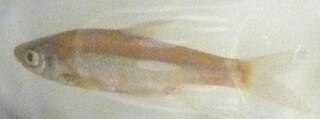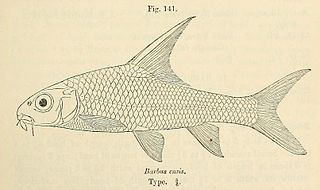
Ischikauia is a monospecific genus of freshwater ray-finned fish belonging to the family Xenocyprididae, the East Asian minnows or sharpbellies. The only species in the genus is Ischikauia steenackeri, the wataka, which is endemic to Lake Biwa in Japan. This species was originally described as Opsariichthys steenackeri.
The white Amur bream is a species of freshwater ray-finned fish belonging to the family Xenocyprididae, the East Asian minnows or sharpbellies This is the only species in the monospecific genus Parabramis. It is native to eastern Asia, where found from the Amur River basin in Russia south to Ningbo and Shanghai in China. It is an important food fish, and has been introduced to regions outside its native range.

Labeobarbus ensis is a species of freshwater ray-finned fish belonging to the family Cyprinidae, the carps, barbs and related fishes. This species is endemic to Angola.

Chagunius is a genus of freshwater ray-finned fish belonging to the family Cyprinidae. which includes the carps, barbs and related fishes. The fishes in this genus occur in South and Southeast Asia.
Elopichthys is a monospecific genus of freshwater ray-finned fish belonging to the family Xenocyprididae, the East Asian minnows or sharpbellies. The only species in the genus is Elopichthys bambusa, the yellowcheek or kanyu, a large fish that is found in freshwater habitats in eastern Asia. It ranges from the Amur River in Russia, through China to the Red and Lam Rivers in Vietnam. It prefers relatively warm waters, entirely avoiding colder highlands. It is considered an important food fish where it occurs, reaching up to 2 m in total length and 52.2 kg (115 lb) in weight.
Hainania serrata, also known as the Hainan minnow, is a species of freshwater ray-finned fish belonging to the family Xenocyprididae. the East Asian minnows or sharpbellies. This fish is found in fast flowing hill streams in southern China and Vietnam. It is the only member of the genus Hainania.
Hemiculterella is a genus of freshwater ray-finned fishes belonging to the family Xenocyprididae, the East Asian minnows or sharpbellies. The fishes in this genus occur in eastern Asia. There are currently three species in this genus.
Longiculter is a monospecific genus of freshwater ray-finned fish belonging to the family Xenocyprididae, the East Asian minnows or sharpbellies. The only species in the genus is Longiculter siahi. This fish is found in Southeast Asia where it is found in Cambodia, Laos and Thailand. It is the only member of its genus. It was described by the American ichthyologist Henry Weed Fowler from two specimens collected from central Thailand in 1937. There have been no further records of this species from Thailand and there is some doubt as to the validity of this species. There have been reports of this species from Cambodia in 1985 and from southern Lao PDR but the identification has yet to be confirmed. The IUCN therefore classify this species as Data Deficient.
Luciobrama is a monospecific genus of freshwater ray-finned fish belonging to the family Xenocyprididae, the East Asian minnows or sharpbellies. The only species in the genus is Luciobrama macrocephala, the long spiky-head carp, a fish that is found in China and Vietnam. It is classified as data deficient by the IUCN. It is found in rivers and lakes. Larger fish, over 30 centimetres (12 in) live nearer the bottom and the smaller specimens are found higher in the water column. They are partially migratory. It has not been recorded from four of its known spawning sites since 1988.
Metzia is a genus of freshwater ray-finned fish belonging to the family Xenocyprididae, the East Asian minnows or sharpbellies. The fishes in this genus are found in Asia. The genus is named in honor of the American ichthyologist Charles William Metz of Stanford University.

Nipponocypris is a genus of freshwater ray-finned fish belonging to the family Xenocyprididae, the East Asian minnows or sharpbellies. This genus has three extant species from eastern Asia and a fourth, extinct species from Middle Pleistocene-aged freshwater strata from the Kusu Basin in Japan.
Ochetobius is a monospecific genus of freshwater ray-finned fish belonging to the family Xenocyprididae, the East Asian minnows or sharpbellies. The only species in the genus is Ochetobius elongatus, a fish found in eastern Asia.

Oxygaster is a genus of freshwater ray-finned fish belonging to the family Xenocyprididae, the East Asian minnows or sharpbellies. The species in this genus are found in Southeast Asia.
Paralaubuca s a genus of freshwater ray-finned fish belonging to the family Xenocyprididae, the East Asian minnows or sharpbellies. The species in this genus are found in Asia.

Parazacco is a monospecific genus of freshwater ray-finned fish belonging to the family Xenocyprididae, the East Asian minnows or sharpbellies. The only species in the genus is Parazacco spilurus, the predaceous chub, a fish found in China and Vietnam. The International Union for Conservation of Nature has classified this species as Data Deficient but Parazacco fasciatus, now regarded as a synonym of P. spilurus, is classified as being Least Concern.
The smallscale yellowfin is a species of freshwater ray-finned fish belonging to the family Xenocyprididae, the East Asian minnows or sharpbellies. This species is found from the southern part of the Amur drainage systems, including the Ussuri and Lake Khanka, and along the major river drainages of China south to the Xi River in southwestern China and northern Viet Nam. The smallscale yellowfin has a maximum published total length of 70 cm (28 in). This species was first formally described in 1872 as Plagiognathus jelskii by the Polish naturalist and physician Benedykt Dybowski with its type locality given as Lake Khanka and the Ussuri River. Dybowski's genus name was objectively invalid as it was preoccuppied by by Plagiognathus Fieber, 1858 in Hemiptera and in 1907 Lev Berg proposed the genus name Plagiognathops for this taxon.

Rohtee is a monospecific genus of freshwater ray-fiined fish belonging to the family Cyprinidae. the family which includes the carps, barbs and related fishes. The only species in the genus is Rohtee ogilbii, the Vatani rohtee, which is endemic to the northern Western Ghats in southern India.
Xenobarbus is a monospecific genus of freshwater ray-fiined fish belonging to the family Cyprinidae. the family which includes the carps, barbs and related fishes. The only species in the genus is Xenobarbus loveridgei which is endemic to Tanzania where it is found in Lake Victoria. The species is rare and only known from a few specimens.
Paralaubuca harmandi is a species of freshwater ray-finned fish belonging to the family Xenocyprididae, the East Asian minnows or sharpbellies. This fish is from south east Asia. It occurs in the Mekong and Chao Praya in Thailand, Laos, Cambodia and Vietnam. It is a solitary species which is normally found as scattered individuals in the shallow and medium depths of large rivers. It feeds on zooplankton and insects of larger size than the other species in Paralaubuca. It moves into floodplains during the monsoon to feed and maybe to breed, and it has also been recorded undertaking short migrations upstream in rivers. It is fished for by both commercial and subsistence fisheries and it is processed into fermented products in Cambodia while elsewhere it is salted and dried. This species is rare in the aquarium trade.
Paralaubuca typusis a species of freshwater ray-finned fish belonging to the family Xenocyprididae, the East Asian minnows or sharpbellies. This fish occurs in south-east Asia. It is found in Thailand in the basins of the Chao Phraya, Tapi, Mekong and Mae Klong and in the Mekong on Laos and Cambodia, as well as Vietnam where it is also found in the La Ngà River. It is one of the most abundant fish species in the lower Mekong.







